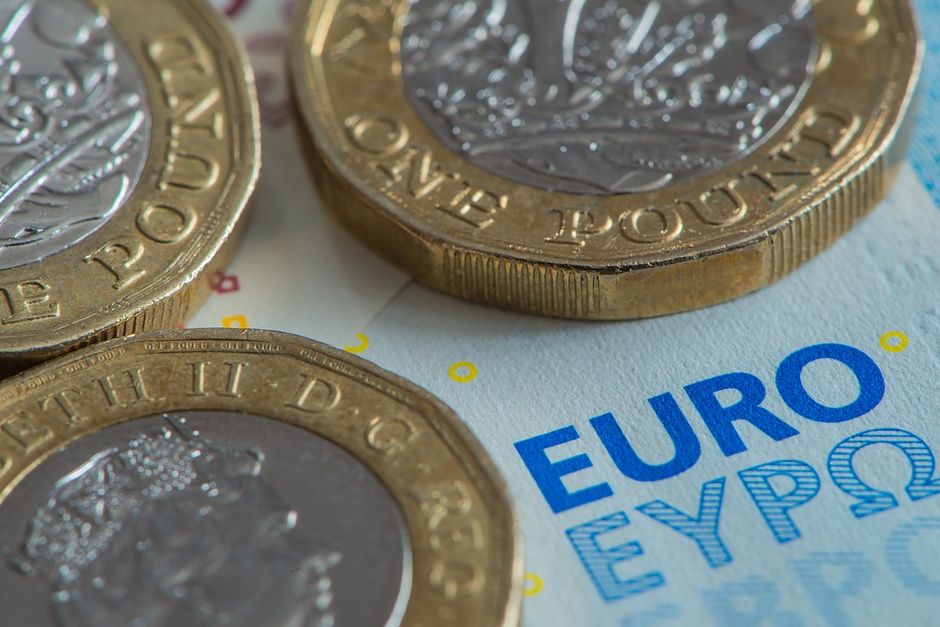EUR/GBP extends upside above 0.8550 ahead of Eurozone Retail Sales data
- EUR/GBP trades in positive territory for the fourth consecutive day around 0.8575 in Tuesday’s early European session.
- German Factory Orders climbed 3.9% MoM in June vs. -1.6% prior, better than expected.
- BoE’s Bailey said the central bank must be careful about further rate cuts, while investors bet on more rate cuts before year-end.

The EUR/GBP cross extends the rally near 0.8575 during the early European session on Tuesday. The uptick of the Euro (EUR) is bolstered by the recent upbeat German economic data. Traders will take more cues from the Eurozone June Retail Sales for June, which is due later on Tuesday.
The stronger-than-expected German Factory Orders contribute to the shared currency’s further upside. Data released by the Federal Statistics Office showed on Tuesday that the country’s Factory Orders jumped 3.9% MoM in June from a fall of 1.6% in May. This figure was above the market consensus of 0.8%.
The Eurozone June Retail Sales are expected to increase 0.1% YoY in June. If the retail sector in the Eurozone shows improvement, this could lift the Euro (EUR) against the Pound Sterling (GBP). On the other hand, the downbeat outcome might trigger the potential European Central Bank (ECB) interest rate cuts in September, which might drag the shared currency lower.
On the GBP’s front, the Bank of England (BoE) decided to cut its interest rates by 25 basis points (bps) to 5% last week. BoE governor Andrew Bailey noted that the rate decision will be decided "from meeting to meeting," but market players expect the UK central bank will deliver more rate cuts in September, with the chance of a move at its next meeting in September seen as a nearly 55% probability.
Euro FAQs
The Euro is the currency for the 20 European Union countries that belong to the Eurozone. It is the second most heavily traded currency in the world behind the US Dollar. In 2022, it accounted for 31% of all foreign exchange transactions, with an average daily turnover of over $2.2 trillion a day. EUR/USD is the most heavily traded currency pair in the world, accounting for an estimated 30% off all transactions, followed by EUR/JPY (4%), EUR/GBP (3%) and EUR/AUD (2%).
The European Central Bank (ECB) in Frankfurt, Germany, is the reserve bank for the Eurozone. The ECB sets interest rates and manages monetary policy. The ECB’s primary mandate is to maintain price stability, which means either controlling inflation or stimulating growth. Its primary tool is the raising or lowering of interest rates. Relatively high interest rates – or the expectation of higher rates – will usually benefit the Euro and vice versa. The ECB Governing Council makes monetary policy decisions at meetings held eight times a year. Decisions are made by heads of the Eurozone national banks and six permanent members, including the President of the ECB, Christine Lagarde.
Eurozone inflation data, measured by the Harmonized Index of Consumer Prices (HICP), is an important econometric for the Euro. If inflation rises more than expected, especially if above the ECB’s 2% target, it obliges the ECB to raise interest rates to bring it back under control. Relatively high interest rates compared to its counterparts will usually benefit the Euro, as it makes the region more attractive as a place for global investors to park their money.
Data releases gauge the health of the economy and can impact on the Euro. Indicators such as GDP, Manufacturing and Services PMIs, employment, and consumer sentiment surveys can all influence the direction of the single currency. A strong economy is good for the Euro. Not only does it attract more foreign investment but it may encourage the ECB to put up interest rates, which will directly strengthen the Euro. Otherwise, if economic data is weak, the Euro is likely to fall. Economic data for the four largest economies in the euro area (Germany, France, Italy and Spain) are especially significant, as they account for 75% of the Eurozone’s economy.
Another significant data release for the Euro is the Trade Balance. This indicator measures the difference between what a country earns from its exports and what it spends on imports over a given period. If a country produces highly sought after exports then its currency will gain in value purely from the extra demand created from foreign buyers seeking to purchase these goods. Therefore, a positive net Trade Balance strengthens a currency and vice versa for a negative balance.
Author

Lallalit Srijandorn
FXStreet
Lallalit Srijandorn is a Parisian at heart. She has lived in France since 2019 and now becomes a digital entrepreneur based in Paris and Bangkok.

















